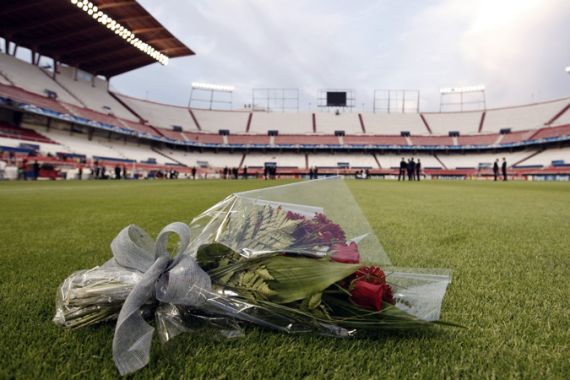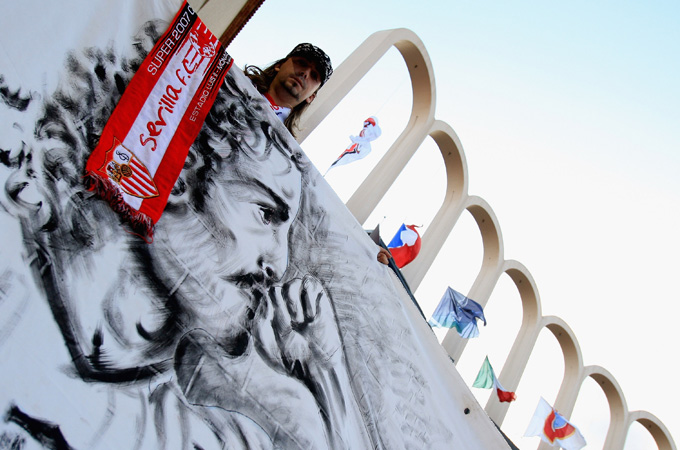Heart attacks prompt Spanish action
High-profile deaths among footballers lead to players’ union demanding life-saving equipment in lower leagues.

 |
| A flag depicting Antonio Puerta is displayed by a Sevilla fan following the player’s death in 2007 [GALLO/GETTY] |
As Miguel Garcia recovers from the heart attack which almost killed him during a second-division football match in Spain, he can thank changes in the law following the death of another player for saving his life.
Garcia’s collapse, during a game between his Salamanca side and Real Betis at the end of October, was the latest in a series of incidents that have shocked Spanish soccer fans.
Keep reading
list of 4 itemsHolders Man City go out of Champions League on penalties to Real Madrid
Barca crash out as Mbappe brace leads PSG to Champions League last four
Saudi reviews football fan rules after whip attack
Sevilla’s Antonio Puerta died in hospital three days after collapsing during a Primera Division match in 2007 at the age of 22 and his death sparked a new law that all first and second division clubs should keep defibrillators ready at their grounds.
Real Madrid’s Ruben de la Red survived after collapsing during a Copa del Rey match in October 2008 and last month announced that he was heeding doctors’ advice not to return to the game as a player, taking up a coaching job instead.
Espanyol’s Dani Jarque died suddenly in his hotel room while on a pre-season tour in 2009 and Sevilla’s Sergio Sanchez is trying to come back after surgery on a heart condition discovered by doctors in January.
The 31-year-old Garcia, however, will not return to the field after being told by doctors to give up playing.
Defibrillators
Experts say the problem is not peculiar to Spain but the country’s players’ union (AFE) wants the rule on keeping defibrillators and a doctor standing by extended to lower-division clubs.
“They don’t think there are more cases in Spain, it is just the high-profile nature of the league, but it is true there seem to have been a number of cases in quick succession,” Jesus Diaz Peramos, vice-president of the AFE, told the Reuters news agency.
 |
| Espanyol captain Jarque a week before he died in 2009 [GALLO/GETTY] |
“We are also talking about the third and fourth tiers of football. These cases don’t grab the headlines in the same way but there have been seven or eight (collapses) this year.”
Part of the proceeds of world champions Spain’s next international friendly on March 9 will be spent on defibrillators and training courses.
The AFE has been comparing notes with players’ unions in other countries.
“We all need to look for solutions together,” Diaz Peramos said.
“It’s difficult because the legislation is different in every country but football generates a lot of income so it isn’t much to ask that some of this money can be channelled towards this issue. It would be money well spent.”
Araceli Boraita, a cardiologist and member of the government-run Sports Council (CSD), said other countries had similar problems.
“There aren’t more cases in Spain than in other countries,” Boraita said.
“It’s just that recently there have been more cases with a high media profile. They all end up in the news but it isn’t the case that there are more of them here than in other European countries or in the rest of the world.
“The cases of Puerta, Jarque, Garcia and De La Red all had different pathologies.
“They all started with heart arrhythmias (irregular heartbeats) which caused a cardio respiratory halt but that is where the similarity ends. The causes have all been different.”
Since the Puerta case, Spain has extended rules on obligatory fitness tests for sports competitors in football and basketball.
The government was seeking to extend those tests soon to include those competing at regional and national levels and by 2020 to all casual sports enthusiasts, such as gym users, Boraita said.